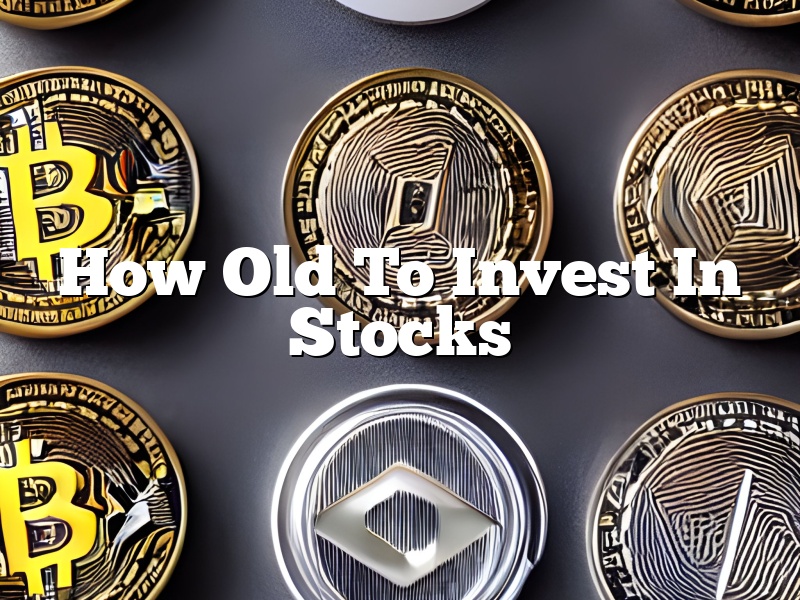How Old To Invest In Stocks
How old do you have to be to invest in stocks?
The answer to this question may vary, as different brokerage firms may have different age requirements for their clients. Typically, you must be at least 18 years old to open an account and trade stocks, but there are some exceptions. For example, Vanguard requires their youngest clients to be at least 18 years old, but allows those who are younger than 18 to invest in certain Vanguard products, such as Vanguard mutual funds and ETFs.
There are a few things to keep in mind if you are considering investing in stocks while still a minor. First, you will need to have a parent or guardian open an account for you and act as your custodian. This person will be responsible for making investment decisions on your behalf and for managing the account. Additionally, you will likely be subject to a higher level of risk if you invest in stocks while still a minor, as you have less experience and knowledge than adults who are investing. It is therefore important to do your research before investing and to consult with a financial advisor if you have any questions.
Ultimately, the decision of whether or not to invest in stocks while still a minor is up to the individual investor. However, it is important to be aware of the risks and responsibilities involved in stock investing at a young age, and to make sure you are comfortable with the decision before proceeding.
Contents
Can I invest in stocks at 16?
Many people wonder if they are able to invest in stocks at 16. The answer to this question is yes, you are able to invest in stocks at 16, but there are a few things you should keep in mind before you make your first investment.
First, you should make sure that you have a solid understanding of what stocks are and how they work. You should also understand the risks involved in investing, as well as the potential rewards.
Second, it is important to have a realistic idea of how much money you can afford to lose. Stocks can be volatile, and there is always the possibility that you could lose money on your investment.
Finally, you should always consult with a financial advisor before investing in stocks. They can help you to determine if investing in stocks is the right decision for you, and they can give you advice on how to invest your money safely and responsibly.
Can a 13 year old have stocks?
Can a 13 year old have stocks?
The short answer to this question is yes, a 13 year old can have stocks. However, it is important to note that there are a few things to consider before making this investment.
One thing to keep in mind is that a 13 year old may not be able to make investment decisions on their own. In most cases, stocks will need to be held in a custodial account, which is an account that is managed by a parent or guardian.
Another thing to consider is the amount of money that will be invested. A 13 year old may not have a lot of money to invest, and this may not be the best investment option for them.
It is also important to consider the risks associated with stock investments. There is always the potential for losses, and a 13 year old may not be able to handle those risks.
Overall, a 13 year old can have stocks, but it is important to do your research and make sure that this is the right investment for you.
What is the youngest age for stocks?
What is the youngest age for stocks?
There is no definitive answer to this question as it depends on the individual and their circumstances. However, there are some general guidelines that can be followed.
Generally speaking, stocks can be purchased by individuals at any age, as long as they have the financial resources to do so. In some cases, parents may choose to purchase stocks for their children as a way to teach them about investing and financial responsibility at an early age.
However, it is important to note that stocks can be risky investments, and it is important to consult with a financial advisor before making any decisions. Young investors should be prepared to lose some or all of their investment if the stock market takes a downturn.
There is no right or wrong answer when it comes to the youngest age for stocks. It is important to weigh the risks and benefits of investing in stocks and to make a decision that is best for you and your financial situation.
How can a 14 year old invest?
Investing can seem like a daunting task, but it doesn’t have to be. For young people, there are a few key things to keep in mind when investing.
The first step is to start with a small sum of money and learn as much as you can about investing. This can include reading books, articles, and watching videos on the subject. In order to be successful, you need to have a good understanding of what you’re investing in and why.
Next, invest in things you understand. Don’t invest in something just because you think it’s going to make you a lot of money. Invest in things that you’re interested in and that you think have potential.
It’s also important to diversify your investments. Don’t put all your eggs in one basket. Spread your money out among different types of investments, such as stocks, bonds, and mutual funds.
Finally, be patient. It may take a while for your investments to pay off. But if you stick with it, you’ll eventually see a return on your investment.
Investing can be a great way to grow your money and secure your financial future. By following these tips, young people can get started investing with ease.
Can a 14 year old invest in Bitcoin?
Bitcoin is a digital asset and a payment system invented by Satoshi Nakamoto. Transactions are verified by network nodes through cryptography and recorded in a public dispersed ledger called a blockchain. Bitcoin is unique in that there are a finite number of them: 21 million.
Bitcoins are created as a reward for a process known as mining. They can be exchanged for other currencies, products, and services. As of February 2015, over 100,000 merchants and vendors accepted bitcoin as payment.
Bitcoin is legal in most countries.
In the United States, the IRS ruled that bitcoin is property for tax purposes. This means that bitcoin earnings are subject to capital gains taxes.
The SEC released a report in July 2017 stating that DAO tokens, which were sold in a crowdsale, were securities and therefore subject to SEC regulations.
In August 2017, the Chinese government announced a ban on initial coin offerings (ICOs).
As of September 2017, the total value of all existing bitcoins exceeded $100 billion.
Can a 14-year-old invest in Bitcoin?
Bitcoin is a digital asset and a payment system invented by Satoshi Nakamoto. Transactions are verified by network nodes through cryptography and recorded in a public dispersed ledger called a blockchain. Bitcoin is unique in that there are a finite number of them: 21 million.
Bitcoins are created as a reward for a process known as mining. They can be exchanged for other currencies, products, and services. As of February 2015, over 100,000 merchants and vendors accepted bitcoin as payment.
Bitcoin is legal in most countries.
In the United States, the IRS ruled that bitcoin is property for tax purposes. This means that bitcoin earnings are subject to capital gains taxes.
The SEC released a report in July 2017 stating that DAO tokens, which were sold in a crowdsale, were securities and therefore subject to SEC regulations.
In August 2017, the Chinese government announced a ban on initial coin offerings (ICOs).
As of September 2017, the total value of all existing bitcoins exceeded $100 billion.
How do high schoolers invest?
How do high schoolers invest?
There are a few different ways that high schoolers can invest their money. One way is to invest in stocks. When you invest in stocks, you are buying a small piece of a company. This means that you will earn a share of the company’s profits. You can also invest in bonds. Bonds are a type of loan. When you invest in a bond, you are lending money to a company or the government. You will earn interest on the bond, and you will get your money back when the bond matures.
Another way to invest is to buy property. When you buy property, you are buying a piece of land or a building. You will earn money from the property by renting it out or by selling it. You can also invest in gold or other precious metals. When you invest in gold, you are buying a physical asset that will always have value.
Which type of investment is right for you depends on your goals and your risk tolerance. If you are willing to take on more risk, you can invest in stocks or property. If you want a less risky investment, you can invest in bonds or gold. It is important to consult with a financial advisor to figure out which investment is right for you.
How do I invest my kids?
When it comes to investing, there are a lot of things to think about. You need to consider your goals, your timeline, and your risk tolerance. But what about your kids? How do you invest for them?
There are a few things to think about when investing for your kids. One is your time horizon. How long do you plan to wait before you need to access the money? Another is your age. How old are your kids?
One option for investing for kids is to use a 529 plan. This is a tax-advantaged investment account that can be used to save for college. You can contribute to a 529 plan until your child is age 18, and the withdrawals are tax-free as long as the money is used for qualified educational expenses.
Another option is to invest in stocks or mutual funds. This can be a good option if you want your kids to have a long-term investment that can grow over time. You can choose stocks or mutual funds that match your risk tolerance and your child’s age.
It’s important to talk to your financial advisor to find the right investment options for your kids. He or she can help you create a plan that fits your needs and your children’s future.






0